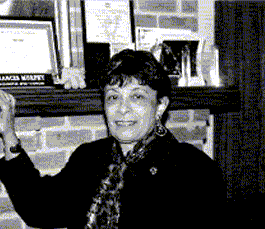Page 1
[Begin Tape 1, Side A]
Ingersoll: What was it like growing up in a family that was focused on a newspaper? If that's not the way to put it, "a family focused on a newspaper," please change it.
Murphy: A family focused on a newspaper. I guess the earliest memory I would have would be the fact that we did a lot of reading. The dinner time was structured. The dinner was a structured meal. My earliest memory is that my mother [Vashti Turley Murphy] would read a story, "Up the Down Staircase," and that we were expected to pick out the main idea, we were expected to tell her what it meant and how it would affect our lives, and maybe what the lesson was. It was just a very quiet sort of thing.
I remember the early book reports. We didn't call them book reports. We were assigned to come to the dinner table with something that we had read, to talk about. She didn't call them book reports. She would just say, "Tonight is your night that you're going to discuss that." Remember now, I grew up in the days when there wasn't television, the early days, and the radio that was allowed, my memory is "Howdy Doody Time" and "Mert and Marge." When my father's car came into the driveway, even those were turned off. This was talking time, this was family time, this was discussion of grades and discussion of what you were going to do tomorrow. In the morning we would all have to be standing at the front door ready to move when my father [Carl James Greenbury Murphy] moved to go in town, because we lived in the suburbs.
Let me back up. Up until I was five, we lived in the city, which would normally be called the inner city now. Of course, at that time it was just the city.
Ingersoll: That was Baltimore.
Murphy: That was Baltimore, 1051 Myrtle Avenue. There was a lovely park in front of our house. In fact, I remember the people who lived on both sides, a doctor [Dr. Carper] and people who we remembered all our lives. It was a pretty close-knit neighborhood, a drugstore on the corner owned by Dr. T. Henderson Kerr, and there was a church across the way, Perkins Square. So it was a fairly close-knit neighborhood. I remember we had a big front yard. We would sit on the front steps and wait for my father to come home, and we had to be clean and starched. Boy, were we starched. I can think about the fact that when you sat down, the starch hurt you. It was really something.
I was the youngest of five girls, so therefore I was the one who couldn't go off the steps unless an older child went with me. I was the one who was always left behind when my other sisters went off to places. I was the one usually left at home with my mother and the housekeeper. So those were really nice days.

